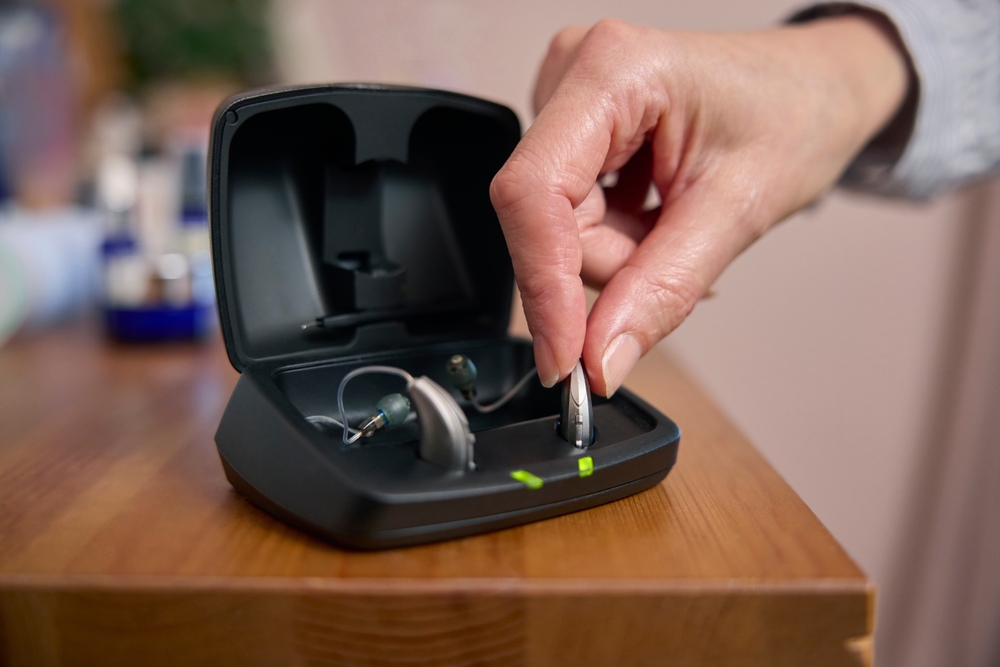Today’s hearing aids are smarter, smaller, and more powerful than ever. But one big decision remains when choosing the right device: Should you go with rechargeable or battery-powered hearing aids?
Both options can dramatically improve your hearing and quality of life, but they offer different features, benefits, and trade-offs. If you’re researching your next hearing device, this guide will help you compare the two and figure out which option fits your lifestyle best!
What are rechargeable hearing aids?
Rechargeable hearing aids are powered by built-in lithium-ion batteries that are charged daily using a docking station or portable charger. Many models can hold a full charge for 24–30 hours, even with Bluetooth streaming.
Benefits of rechargeable hearing aids
- No more tiny batteries: Forget fumbling with small battery doors—just place your aids in the charger overnight and you’re good to go.
- Environmentally friendly: One rechargeable battery can last several years, reducing waste and the need to frequently buy and dispose of batteries.
- Ideal for active lifestyles: Many models are water-resistant and durable, with enough power to last through work, errands, and exercise.
- Great for dexterity issues: If you have arthritis or difficulty handling small objects, rechargeables offer a much easier experience.
Things to consider
- Upfront cost may be higher, though you save over time by not buying disposable batteries.
- Must remember to charge nightly—though many models include alerts or reminders to help with this.
- Limited battery life span: Most rechargeable batteries need to be replaced every 3–5 years, typically by a professional.
What are battery-powered hearing aids?
Traditional hearing aids use disposable zinc-air batteries that come in standardized sizes (10, 312, 13, and 675). Depending on the model and usage, these batteries last 3–10 days before needing to be changed.
Benefits of battery powered hearing aids
- Instant power: Pop in a fresh battery and go—no waiting for a charge.
- Flexible storage: Batteries are small and portable, making it easy to carry spares for travel or emergencies.
- Lower initial cost: Battery-powered models often have a lower upfront price point than rechargeable ones.
Things to consider
- Ongoing cost and maintenance: Replacing batteries regularly adds up over time and requires planning.
- Not ideal for all dexterity levels: Changing small batteries can be frustrating for those with limited vision or hand strength.
- Environmental impact: Disposable batteries contribute to waste if not properly recycled.
Which option is right for you?
The best choice comes down to your lifestyle, comfort, and personal preferences.
Choose rechargeable if you:
- Prefer convenience and fewer maintenance tasks
- Have mobility or dexterity challenges
- Want a more environmentally friendly option
- Use features like Bluetooth streaming regularly
Choose battery-powered if you:
- Prefer the flexibility of swapping batteries on the go
- Don’t mind regular maintenance
- Want a lower-cost entry into hearing aids
- Travel frequently and don’t want to rely on a charger
Your hearing specialist can help you weigh the options and even let you try different models to see which feels right! There are so many options these days, there is a hearing aid for every individual’s preference and needs.
Power up your hearing, your way
Whether you go rechargeable or battery-powered, modern hearing aids offer life-changing clarity, comfort, and control. The key is finding the model that fits seamlessly into your routine—because when your hearing is supported, so is your overall health, mood, and connection to others!
Ready to explore your options? Find a hearing specialist in your area today to schedule a hearing aid consultation. During an appointment, your hearing specialist will walk you through your choices and help you find the perfect fit for your hearing—and your lifestyle.



